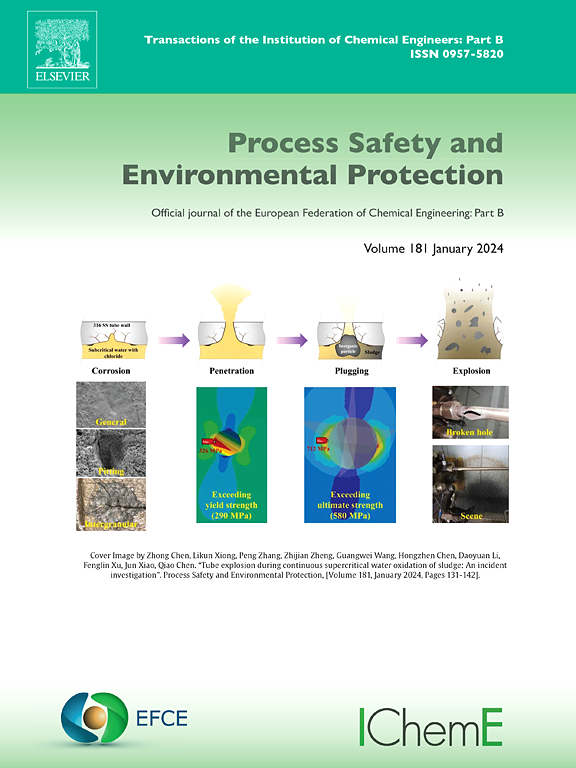Electric vehicle battery closed-loop supply chain pricing and carbon reduction decisions under the carbon cap-and-trade and reward-penalty policies
IF 6.9
2区 环境科学与生态学
Q1 ENGINEERING, CHEMICAL
引用次数: 0
Abstract
Recycling end-of-life electric vehicles (EVs) batteries to conserve resources and reduce carbon emissions has obtained a great deal of concern. This paper studied how carbon cap-and-trade and reward-penalty measures jointly impacted EV battery pricing and decarbonization strategies. Three recycling modes covering single-participator, mixed-participator, and joint recycling are established. Optimal pricing and carbon mitigation strategies, total revenue, and recycling percentage are solved and compared. The dynamic effects of target recycling percentage and rewards and punishments on total revenue and recycling percentage are analyzed by numerical examples. Results show that: (1) The factory price, selling price, collection price, and carbon emission mitigation scale of power batteries are affected by cap-and-trade and reward-penalty mechanisms; (2) Reward-penalty can improve both total revenue and recycling percentage; (3) The cap-and-trade mechanism optimizes the total revenues, showing that the total revenue increase with the increasement of carbon quota and carbon price, while the increase of carbon price leads to worse recycling percentage; (4) The supply chain performance under different recycling modes is affected by policy intervention, and the joint recycling mode is better.
碳限额交易和奖惩政策下的电动汽车电池闭环供应链定价和碳减排决策
回收报废电动汽车(EV)电池以节约资源和减少碳排放已引起广泛关注。本文研究了碳限额交易和奖惩措施如何共同影响电动汽车电池定价和去碳化策略。建立了单一参与者、混合参与者和联合回收三种回收模式。对最优定价和碳减排策略、总收入和回收比例进行了求解和比较。通过实例分析了目标回收率和奖惩对总收入和回收率的动态影响。结果表明(1)限额交易机制和奖惩机制对动力电池的出厂价、销售价、回收价和碳减排规模均有影响;(2)奖惩机制既能提高总收入,又能提高回收率;(3)限额交易机制优化了总收入,表明总收入随碳配额和碳价格的增加而增加,而碳价格的增加导致回收率降低;(4)不同回收模式下的供应链绩效受政策干预的影响,联合回收模式效果更好。
本文章由计算机程序翻译,如有差异,请以英文原文为准。
求助全文
约1分钟内获得全文
求助全文
来源期刊

Process Safety and Environmental Protection
环境科学-工程:化工
CiteScore
11.40
自引率
15.40%
发文量
929
审稿时长
8.0 months
期刊介绍:
The Process Safety and Environmental Protection (PSEP) journal is a leading international publication that focuses on the publication of high-quality, original research papers in the field of engineering, specifically those related to the safety of industrial processes and environmental protection. The journal encourages submissions that present new developments in safety and environmental aspects, particularly those that show how research findings can be applied in process engineering design and practice.
PSEP is particularly interested in research that brings fresh perspectives to established engineering principles, identifies unsolved problems, or suggests directions for future research. The journal also values contributions that push the boundaries of traditional engineering and welcomes multidisciplinary papers.
PSEP's articles are abstracted and indexed by a range of databases and services, which helps to ensure that the journal's research is accessible and recognized in the academic and professional communities. These databases include ANTE, Chemical Abstracts, Chemical Hazards in Industry, Current Contents, Elsevier Engineering Information database, Pascal Francis, Web of Science, Scopus, Engineering Information Database EnCompass LIT (Elsevier), and INSPEC. This wide coverage facilitates the dissemination of the journal's content to a global audience interested in process safety and environmental engineering.
 求助内容:
求助内容: 应助结果提醒方式:
应助结果提醒方式:


